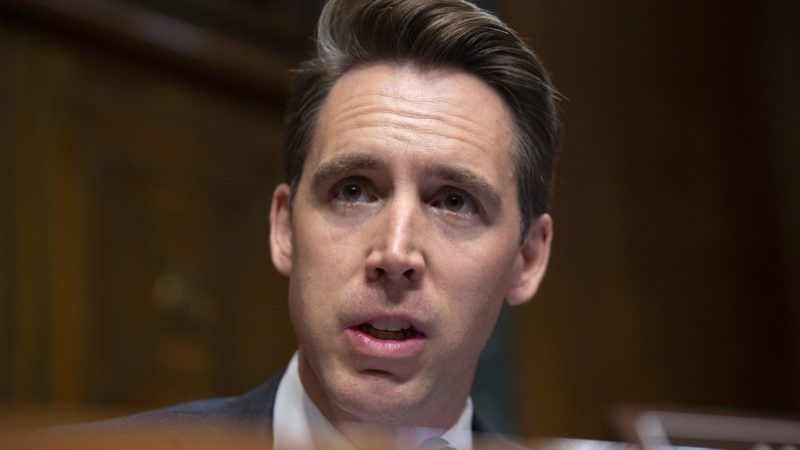Sen. Josh Hawley Wants a Bogus Criminal Investigation Into Amazon
The lawmaker says that the company's data practices violate antitrust law. They do not.

Sen. Josh Hawley (R–Mo.) has made opposition to tech companies a hallmark of his tenure on Capitol Hill. Now he has sent a letter to Attorney General William Barr requesting a criminal investigation into Amazon, which the senator claimed is using "predatory and exclusionary data practices to build and maintain a monopoly."
Hawley's renewed ire toward Amazon stemmed from a Wall Street Journal report that the tech behemoth is using data from its third-party sellers to create private-label Amazon brands. The senator calls that proof the company has breached criminal antitrust laws.
Others call it standard operating procedure.
"It's an extremely common practice," says Alec Stapp, director of technology policy at the Progressive Policy Institute. "When major retailers are developing their own brands, they use all the data available they have. That includes sales data for individual suppliers in their stores or third parties, to see what's selling well and which features customers seem to enjoy."
Frequent any major department or drug store and you'll find a slew of private-label "off-brand" products developed by the retailer and put in direct competition with the name-brand third-party seller. Trader Joe's has "Trader Jose's" and "Trader Giotto's" meal options. CVS sells private-label hygiene products, makeup, and vitamins, among other items. Nordstrom has its own brand for just about everything, from shoes to handbags to accessories. The list goes on.
Amazon doesn't use the practice particularly prolifically—certainly not when compared to other retail giants. When it comes to retail revenue generated by private labeling, Walmart clocks in at 15 percent, Macy's at 20 percent, and U.S. grocery stores around 19 percent. For Amazon, it's 1 percent.
So why is Hawley zeroing in on the latter? The senator has an explanation, but it's not sufficient: "Brick-and-mortar stores collect data," his letter acknowledges, "but online retailers like Amazon can collect so much more… They can track how long a person's attention lingers on a product, which features attract a person's attention, which images a person views and for how long, and what reviews a person reads." He likens that to a physical store "attaching a camera to every customer's forehead."
Yet many of those same stores have lucrative online marketplaces. Walmart, for instance, spent about $1.18 billion on information technology in 2018—far higher than actual IT companies like Microsoft and Facebook. Amazon spent more, shelling out about $1.37 billion. But that difference is hardly the stuff of which monopolies are made, considering that Amazon's marketplace consists almost entirely of online interaction.
While Hawley's antitrust accusations don't hold water, Amazon isn't necessarily guilt-free. The company's terms of service stipulate that it doesn't scoop information from individual sellers, instead analyzing only aggregate data. There is no legal requirement for it to have such a rule, but it does, and the Journal claims that the company broke that promise. If so, Amazon may have engaged in misrepresentation. Such possible breaches should be investigated—but for the relevant reasons. Allegations of criminal antitrust behavior do not meet that criteria, however, and are grounded more in partisan interests than in reality.


Show Comments (24)